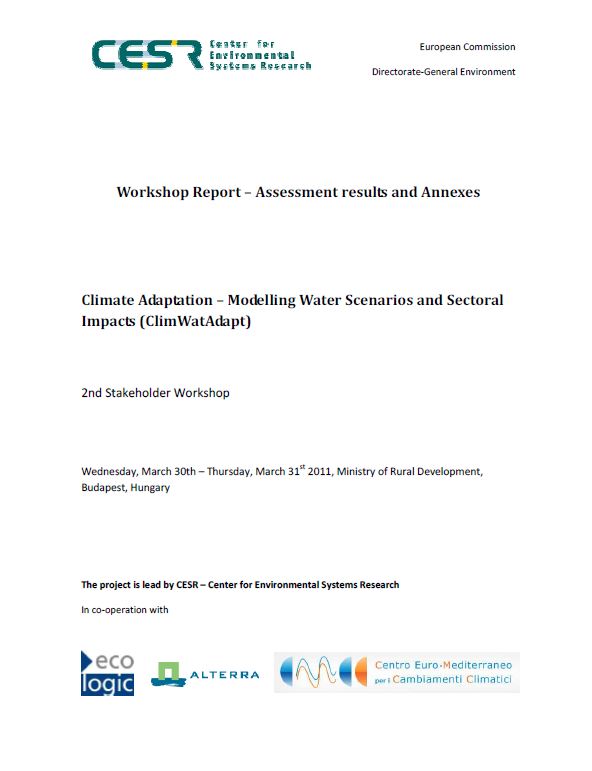Final Report for the Project Climate Adaptation – Modelling Water Scenarios and Sectoral Impacts
- Publikation
- Zitiervorschlag
Flörke, Martina et al. 2011: Final Report for the Project Climate Adaptation – Modelling Water Scenarios and Sectoral Impacts. Center for Environmental Systems Research, Kassel.
Flörke, Martina et al. 2011: Final Report for the Project Climate Adaptation – Modelling Water Scenarios and Sectoral Impacts. Center for Environmental Systems Research, Kassel.
- Sprache
-
Englisch
- Autorenschaft
-
Martina Flörke, Florian Wimmer (CESR)Natasha Marinova, Fons Jaspers, Fulco Ludwig, Rob Swart (Alterra)Carlo Giupponi, Francesco Bosello, Jaroslav Mysiak (CMCC)
- Finanzierung
-
Europäische Kommission, Generaldirektion Umwelt (GD Umwelt), International - Jahr
- Umfang
- 159 S.
- Projekt
- Projekt-ID
- Inhaltsverzeichnis
-
Gesamtes Inhaltsverzeichnis
1 INTRODUCTION
1.1 Objectives of this study
1.2 To whom this report is addressed
1.3 Structure of the study
1.4 Geographical coverage
1.5 Time period covered by the study
1.6 Data sources and availability
1.7 Limitations of the study2 THE INTEGRATED ASSESSMENT FRAMEWORK (IAF)
2.1 The main concepts and scenarios behind the IAF
2.1.1 Conceptual model for climate change impacts, vulnerability and adaptation
2.1.2 The “Driver‐Pressure‐State‐Impact‐Response” (DPSIR) approach and its related indicators
2.1.3 Indicators used in the IAF developed by ClimWatAdapt
2.1.4 Scenarios used
2.2 The different modules of the integrated assessment framework in detail
2.2.1 The IAF in a nutshell
2.2.2 Identification of vulnerable regions and sectors
2.2.3 Analyses and assessment of adaptation measures
2.3 Link of the IAF to WISE and the Clearinghouse
2.4 Gaps of the IAF3 VULNERABILITY ASSESSMENT
3.1 Introduction
3.2 The impact of current EU policies on vulnerability
3.3 Vulnerability to water scarcity
3.4 Vulnerability to droughts
3.5 Vulnerability to floods
3.6 Vulnerability – cross‐sectoral and transboundary aspects
3.6.1 Transboundary aspects
3.6.2 Cross sectoral aspects
3.7 Vulnerability – summary
3.7.1 Vulnerability of the European water sector4 RESULT FROM THE ASSESSMENT OF ADAPTATION OPTIONS
4.1 Introduction
4.2 Summary of the assessment of measures and support actions
4.2.1 Overview of the assessed measures/support actions
4.2.2 Summary of the assessment of the measures/factsheets
4.3 Adaptation measures addressing regional vulnerabilities5 ADDRESSING EU VULNERABILITIES – RECOMMENDATIONS FOR EU ACTION
5.1 Introduction
5.2 Existing EU initiatives to address vulnerabilities to climate change and how they cover current support actions
5.3 What still needs to be done?
5.3.1 Increase the understanding of adaptation, improving and widening the knowledge base and enhancing access to adaptation related information (objective 1)
5.3.2 Developing adaptation action and mainstreaming of adaptation into policies at EU level (Objective 2)
5.3.3 National implementation of climate adaptation requirements, and support to and facilitation of exchange between Member States, regions, cities and all other relevant stakeholders (Objective 3)
5.3.4 Capturing the potential of the market, market‐based instruments and the private sector in strengthening adaptive capacity and climate impact preparedness and responses (Objective 4)
5.3.5 Adaptation measures that should be subject to a critical analysis at the European level
5.4 Discussing proposed measures/support actions in the context of the current EU adaptive capacity6 REFERENCES
ANNEX
- Schlüsselwörter
Bosello, Francesco et al. 2013: Challenges to Planning Climate Adaptation Strategies in Europe, Berlin: Ecologic Institut.
Weiland, Sabine; Silke Beck; Benjamin Boteler et al. 2013: Criteria for Evaluating Climate Adaptation Measures: A Meta-Analysis. Science for the Environment. Mapping Knowledge Needs for Future Horizons. Aarhus: Aarhus University, DCE-Danish Centre for Environment and Energy, 102.
Pedersen, Anders Branth; Helle Ørsted Nielsen; Kirsi Mäkinen et al. 2013: Coherent Policy Instruments for Climate Change Adaptation? Science for the Environment. Mapping Knowledge Needs for Future Horizons. Aarhus: Aarhus University, DCE-Danish Centre for Environment and Energy, 101.



